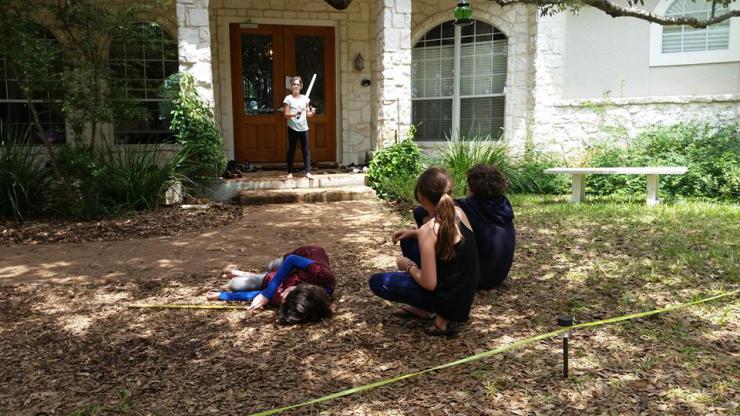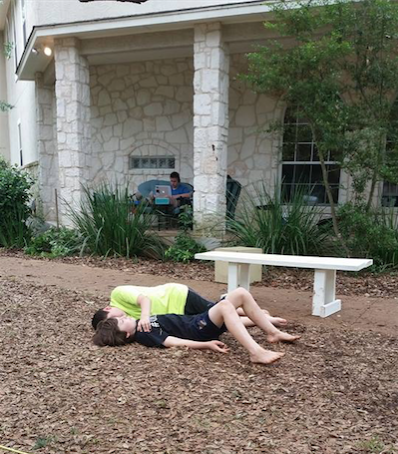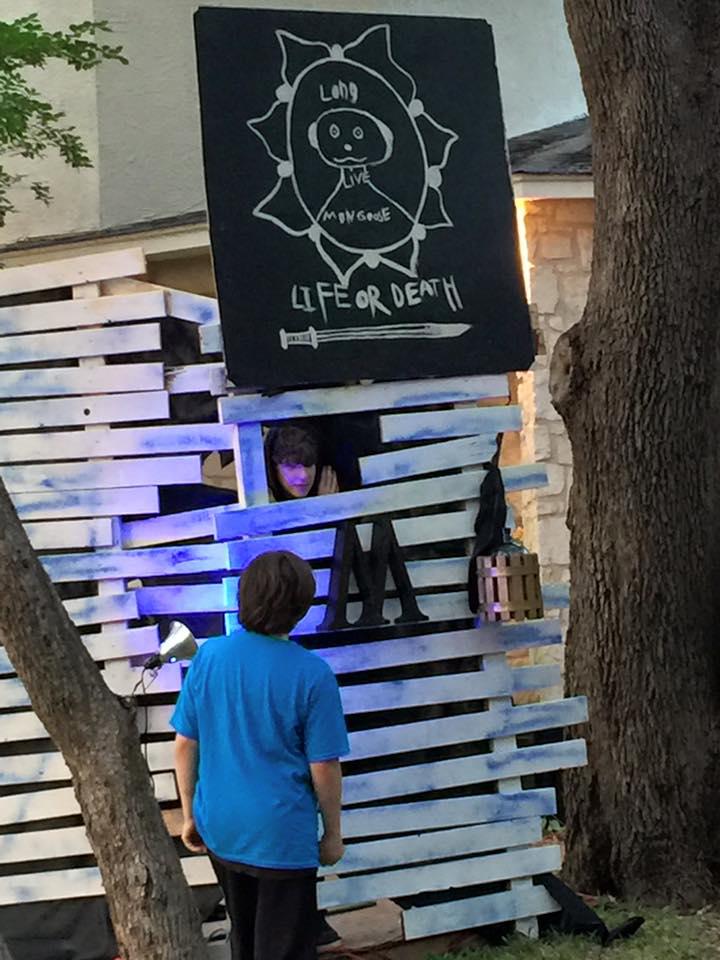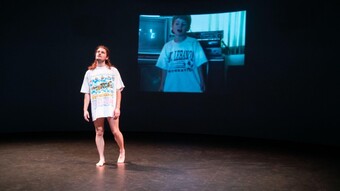Notes from the Skybridge Production of Romeo and Juliet
In a small school in Texas, a group of junior high students performed an inventive LGBTQ+ adaptation of Romeo & Juliet last May. In this blog series, queer playwright Briandaniel Oglesby reflects on how the project evolved, how the students and community responded, and what he thinks this all means.
Update 1: Two Months Out
“When is the play?” asks a student—the Friar. The Nurse answers, “The Friday and Saturday before school ends.” (Late May.) Romeo adds, “And maybe the Sunday, if someone’s grandparent can only make Sunday or something.” Another student jumps in, “Not my grandparents! We’re not inviting them. They would be so not OK.” Another, “Yeah, I have a family friend who sees all my plays, but I’m not going to tell her about this one.”
I remember the line in The Laramie Project when a young actor’s parents are more comfortable with him playing a murderer in the Scottish Play than a gay man in Angels in America. Playing a gay person does not make one gay, of course. And the students know this. Arguments that this will “recruit” them are easily refutable, despite the myth that homosexuality is a lifestyle choice.
I’m struck that one experience that connects my students to the queer experience is the question—to out, or not to out the play?

There is the invitation implicit in this project, however, to view gay people as human beings. That is where homophobic folks and allies agree—that this will normalize gay people. As if we weren’t normal to the kids already.
One student impishly suggests that the best people to invite are precisely those uncomfortable with it. This is meant as a prank, meaning we don’t tell them the LGBT storyline. I secretly agree with this notion; our secular theatrical church usually has a robust choir to which we preach progressive values, but the audience for a school play gives us opportunities to sing to the unconverted, even the hostile.
Of course, the students themselves will have to deal with the consequences, not me. They—and their parents—will have those conversations. Did the kids bite off a kind of advocacy that they weren’t prepared to make? Or is this precisely the kind of advocacy that they’re built for, when the “new normal” is, in fact, their normal?
The conversation continues. We talk about the tension in the play itself. Beyond familial hatred, Romeo and Juliet can’t be together because they’re a gay couple. They marry quickly because they’re afraid of losing the right. “Like that one time in California.” We talk about Proposition 8, how gay folks could marry in California for a heartbeat before the 2008 election, and then couldn’t. “I was four in 2008,” says Romeo.
We discuss how recently gay marriage became legal. Our Romeo mentions he went to a gay wedding between octogenarian neighbors who’d been together for sixty years. This generation respects pronouns and is figuring out how to explain the difference between pansexual and bisexual to their parents. I’m struck that one experience that connects my students to the queer experience is the question—to out, or not to out the play?
I agree with my LGBT students who complain that too many stories about gay people end tragically. This narrative often serves to lecture straight people about inclusion or sensitivity, and it’s not for LGBT audiences.

Update 2: Six Weeks Out
Today we spend time on the final scene. The suicide scene. I didn’t want to land on tragedy. I agree with my LGBT students who complain that too many stories about gay people end tragically. This narrative often serves to lecture straight people about inclusion or sensitivity, and it’s not for LGBT audiences. On the other hand, given the need for It Gets Better and the Trevor Project, the play’s suicide also makes it contemporary.
Our community has tears to cry, but I wish for LGBT folks to have happy endings. So we cheat. When Romeo learns his husband is “dead,” the original language leaks in. He gallops to the grave, offs himself, and then Juliet offs himself next.
Then the actors interfere, call for a happy ending, and fix the show. The knife is fake—Juliet is a theatre guy—and the “poison” Romeo drinks is the same potion that Juliet took to mimic death. Having faked their deaths, the boys run away together. Happily ever after.
Update 3: Three Weeks Out
We’re pretty far into the rehearsals now. During a break, I hear the students tell our tech people—high schoolers enthusiastic for the job—what they each contributed. Which lines became the play. Which activities created what.
One student laughs. The Friar. His favorite lines were based on something he’d said, which became a history lesson: “Are you saying you’re homosexual for a guy?” “Well, I wouldn’t put it that way because it’s not the 1950s, but yeah.”
He loves these lines. I love them, too. Another line, is mentioned. Then another. And so on. They are proud of this play. It belongs to them.
Update 4: Two Weeks ’Til Opening
We are choreographing the fight that results in Mercutio and Tybalt’s deaths. Tybalt is female. When Romeo stabs her in a rage, something doesn’t work. Tybalt feels it, too. Something is disturbing. Inappropriate. Even with genders swapped, his anger brings up images of violence against women. It’s an easy fix. Romeo ducks in fear and Tybalt runs into his blade. There.
But it stays with me. Even when we queer the play, there are some things we can’t escape.

Update 5: Tech Week
Juliet will have his script in hand when we perform. Like him, I struggle with line memorization, so I sympathize. But guilt weighs on him. “What’s important about this play?” I ask. A moment of reflection, then: “The story.” This question helps. He’s able to see his work, and that of his classmates, and the larger significance. Good.
Making plays with teenagers means to embody the threshold. Their job is to replace us, and while they will change, they will also carry their culture with them. To work with teenagers is to parody adulthood—and possibly change what will happen in the teens’ adulthood.
Soon, plays for young folks will have plenty of gay characters. It’s silly there aren’t more now.
It won’t be polished, this play, or this performance. In many ways, it will be like every other junior high play. Lines will be skipped, and I’m lighting it with clip lights.
In other ways, it will be something no one has ever seen—yet.
















Comments
The article is just the start of the conversation—we want to know what you think about this subject, too! HowlRound is a space for knowledge-sharing, and we welcome spirited, thoughtful, and on-topic dialogue. Find our full comments policy here
Brian's work is amazing - not just the final production, but the journey he takes the kids through to get there. We are unbelievably lucky to have access to his talents at Skybridge.
Bravo!
Brian, I so appreciate how you've playfully yet truthfully illustrated your pedagogical and artistic choices with this project. It's clear that you treated these young actors with the same integrity that you would treat adult actors. So refreshing.